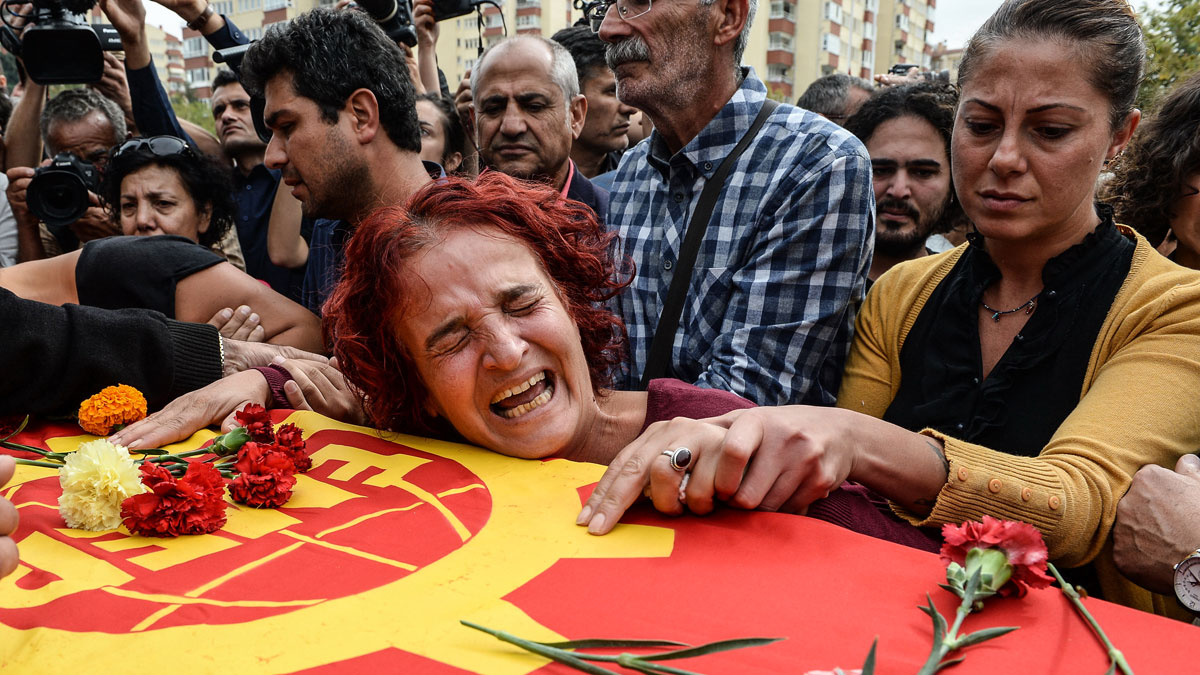Turkey bombs Kurdish rebels as nation continues to mourn
Air strikes launched after deadly suicide bombings at a peace rally in Ankara that left 97 people dead

A free daily email with the biggest news stories of the day – and the best features from TheWeek.com
You are now subscribed
Your newsletter sign-up was successful
Turkish warplanes have struck Kurdish rebel targets in southeastern Turkey and northern Iraq as the country mourns the deadliest terrorist attack in its history.
At least 97 people died and hundreds more were injured when two explosions went off in the middle of crowds outside Ankara's central train station on Saturday.
Thousands had gathered to call for an end to the escalating violence between the government and Kurdistan Workers' Party (PKK) militants.
The Week
Escape your echo chamber. Get the facts behind the news, plus analysis from multiple perspectives.

Sign up for The Week's Free Newsletters
From our morning news briefing to a weekly Good News Newsletter, get the best of The Week delivered directly to your inbox.
From our morning news briefing to a weekly Good News Newsletter, get the best of The Week delivered directly to your inbox.
"The first explosion came. Within seconds, the other one," one man told the BBC. "I realised there were body parts lying in front of us. We were in shock. This was the worst scene I've ever seen."
Senior security officials say that the bombing bears the hallmarks of an Islamic State attack and is similar to the suicide bombing in the border town of Suruc which killed 33 people in July.
"All signs indicate that the attack may have been carried out by Islamic State," a government source told Reuters. "We are completely focused on IS."
Despite this, Turkish air strikes targeted PKK bases after the government rejected a new ceasefire announced by the militant group in the wake of the suicide bombings.
A free daily email with the biggest news stories of the day – and the best features from TheWeek.com
As flags fly at half mast and the country observes three days of national mourning, anger is growing towards the Turkish government.
Many blame the authorities for failing to prevent the attacks. Thousands gathered in Ankara on Sunday chanting: "murderer Erdogan" and "murderer police."
Selahattin Demirtas, leader of the pro-Kurdish People's Democratic Party (HDP) said that Recep Tayyip Erdogan's government had blood on its hands and that the true death toll was at least 128.
"The state which gets information about the bird that flies, and every flap of its wing, was not able to prevent a massacre in the heart of Ankara," he said.
Fresh clashes erupted on Sunday as mourners gathered in the capital. Police used batons, tear gas and water cannon to disperse protesters and those attempting to lay flowers at the scene.
Despite rising tensions, the government has vowed to move forward with elections due to be held next month, promising that security at election rallies will be stepped up.
"Postponing the elections as a result of the attack is not on the table at all, even as an option," said a government source. "The elections will be held on November 1 as planned."
Demirtas urged Turkey to respond to the violence at the ballot box, Bloomberg reports. "We shall not act out of revenge or hatred; we say violence should not beget more violence," he said at a memorial event. "But we will seek to hold people accountable. November 1 is the first step in that."
-
 The ‘ravenous’ demand for Cornish minerals
The ‘ravenous’ demand for Cornish mineralsUnder the Radar Growing need for critical minerals to power tech has intensified ‘appetite’ for lithium, which could be a ‘huge boon’ for local economy
-
 Why are election experts taking Trump’s midterm threats seriously?
Why are election experts taking Trump’s midterm threats seriously?IN THE SPOTLIGHT As the president muses about polling place deployments and a centralized electoral system aimed at one-party control, lawmakers are taking this administration at its word
-
 ‘Restaurateurs have become millionaires’
‘Restaurateurs have become millionaires’Instant Opinion Opinion, comment and editorials of the day
-
 Epstein files topple law CEO, roil UK government
Epstein files topple law CEO, roil UK governmentSpeed Read Peter Mandelson, Britain’s former ambassador to the US, is caught up in the scandal
-
 Iran and US prepare to meet after skirmishes
Iran and US prepare to meet after skirmishesSpeed Read The incident comes amid heightened tensions in the Middle East
-
 Israel retrieves final hostage’s body from Gaza
Israel retrieves final hostage’s body from GazaSpeed Read The 24-year-old police officer was killed during the initial Hamas attack
-
 China’s Xi targets top general in growing purge
China’s Xi targets top general in growing purgeSpeed Read Zhang Youxia is being investigated over ‘grave violations’ of the law
-
 Panama and Canada are negotiating over a crucial copper mine
Panama and Canada are negotiating over a crucial copper mineIn the Spotlight Panama is set to make a final decision on the mine this summer
-
 Why Greenland’s natural resources are nearly impossible to mine
Why Greenland’s natural resources are nearly impossible to mineThe Explainer The country’s natural landscape makes the task extremely difficult
-
 Iran cuts internet as protests escalate
Iran cuts internet as protests escalateSpeed Reada Government buildings across the country have been set on fire
-
 US nabs ‘shadow’ tanker claimed by Russia
US nabs ‘shadow’ tanker claimed by RussiaSpeed Read The ship was one of two vessels seized by the US military